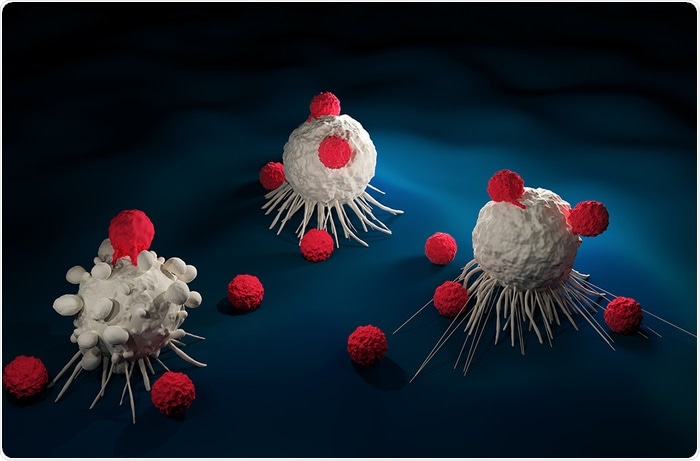Chimeric antigen receptor (CAR) T cell therapy employs engineered T cells to treat certain kinds of cancers. However, this therapy is mostly a challenging approach to treat solid tumors. CAR T cells must identify a specific target on cancer cells to annihilate them.

An image of a CAR T cell. Image Credit: Courtesy of Penn Medicine.
But cancer cells do not have the target always, or they identify means to hide the target and stay invisible to CAR T cell attack. Recent research from Penn Medicine, published in the journal Cell, reveals that RN7SL1, a naturally occurring RNA, can activate the body’s natural T cells to find the cancer cells that evaded recognition by CAR T cells. This might aid in improving efforts to treat solid tumors, which represent the majority of human cancers.
CAR T cells typically are like lone soldiers without backup. However, if given the right tools, they can kickstart the body’s own immune system and give them help against the cancer cells missed with CAR T cells alone.”
Andy J. Minn, Study Co-Lead Author and Professor, Radiation Oncology, Perelman School of Medicine, University of Pennsylvania
Andy J. Minn, MD, Ph.D., is also the director of the Mark Foundation Center for Immunotherapy, Immune Signaling, and Radiation at Penn.
The first tool is an endogenous RNA, or RNA originating from the body’s own cells named RN7SL1. However, RN7SL1 mirrors a viral RNA when delivered to a tumor by CAR T cells. Similar to a viral infection, an arm of the body’s immune system named innate immune cells awakes after sensing RN7SL1 delivered by CAR T cells.
These innate immune cells work to stimulate the body’s T cells, exciting them to join the attack on cancer. However, similar to CAR T cells, the body’s natural T cells also require a target on cancer cells to identify and attack. Hence, the second tool offered by the CAR T cells is foreign antigens, which are “painted” on the surface of cancer cells, specifically marking them for killing by the natural T cells.
Employing mouse models, the scientists demonstrated that arming CAR T cells with this one-two punch to hire the body’s immune system averts tumor relapse even when most of the cancer cells cannot be identified and killed by the CAR T cells solely. Hence, engineering CAR T cells to deliver RN7SL1 and foreign antigens might help combat the common means through which solid tumors evade CAR T cells, thereby improving efficiency.
In addition to helping to recruit the body’s natural immune system, the research reveals that RN7SL1 can enhance the function of CAR T cells themselves. CAR T cells that express RN7SL1 have the added advantage of persisting longer, infiltrating tumors better, and maintaining greater function against tumors.
Strategies that simultaneously employ CAR T cells, enhance endogenous T cell function and counteract common suppressive mechanisms may offer effective combinatorial approaches to improve solid tumor responses.”
Carl H. June, Study Co-Lead Author, Department of Pathology and Laboratory Medicine, Perelman School of Medicine, University of Pennsylvania
Carl H. June, MD, is the Richard W. Vague Professor in Immunotherapy and is also the director of the Center for Cellular Immunotherapies and the Parker Institute for Cancer Immunotherapy at the University of Pennsylvania.
Source:
Journal reference:
Johnson, L. R., et al. (2021) The immunostimulatory RNA RN7SL1 enables CAR-T cells to enhance autonomous and endogenous immune function. Cell. doi.org/10.1016/j.cell.2021.08.004.